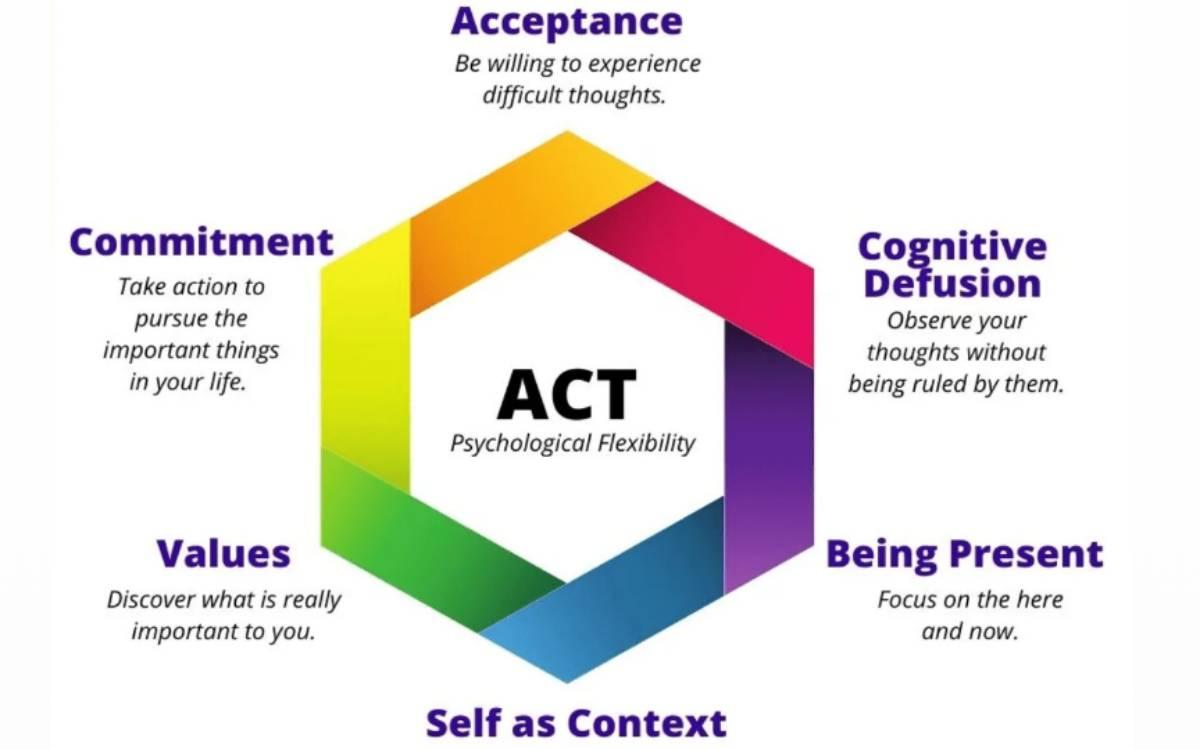Acceptance and Commitment Therapy (ACT) offers a unique route to mental health with its innovative Hexaflex approach. This flexible structure emphasizes psychological adaptation so that people may negotiate their inner sensations and yet be dedicated to important life events.
The Hexaflex increases resilience and self-awareness by providing a dynamic prism through which one could view the intricate interaction of ideas, emotions, and behaviors. Deeper exploration of the ideas of Acceptance and Commitment Therapy reveals the transforming power of the Hexaflex model, therefore guiding paths to psychological and personal development.
The Hexaflex Model In ACT
An integral component of Acceptance and Commitment Therapy (ACT), the Hexaflex model is essentially meant to help people negotiate their thoughts, emotions, and behaviors, so fostering a more adaptive engagement with life; it is a complete framework that captures the central processes of psychological flexibility.
Examining every piece of the hexaflex helps us to better grasp how the linked components support a person’s capacity to accept events and commit to values-based behavior, therefore promoting a whole approach to mental health.

Steven C. Hayes, one of the founders of acceptance and commitment therapy, argues that more psychological flexibility will significantly boost overall quality of life and enable one to attain personal goals.
Analyzing the Hexaflex model could allow one to better grasp the following crucial processes and their results in daily life:
- Acceptance: Embracing thoughts and feelings openly rather than avoiding them.
- Cognitive Defusion: Observing thoughts without attachment, viewing them as mere words.
- Being Present: Engaging fully with the current moment, enhancing awareness and involvement.
- Self-as-Context: Recognizing oneself as more than the sum of one’s thoughts and feelings.
- Values: Identifying and prioritizing what truly matters in life.
- Committed Action: Taking steps consistent with one’s values, despite obstacles.
Differentiating Core Psychological Processes in Acceptance
Acceptance, as a basic component of Acceptance and Commitment Therapy (ACT), depends on realizing and internalizing several core psychological processes that contribute to an individual’s overall psychological flexibility and well-being, with the Hexaflex model brilliantly encapsulating these complex elements, so providing a framework for individuals to negotiate their thoughts, emotions, and behaviors, so fostering a more real engagement with their personal experiences.
In the field of Acceptance and Commitment Therapy, cognitive defusion is of great relevance as it enables people to see their thoughts as mere mental events rather than absolute truths, so allowing a healthy distance from problematic thinking patterns that often impede personal development and emotional wellness, which subsequently leads to successful disengagement from pervasive self-judgments that can be rather disabling, so paving the way for a more adaptive approach to daily challenges.
The following table outlines the important features of each core psychological process together with their consequences for those using Acceptance and Commitment Therapy, therefore highlighting their interdependence:
| Core Process | Description | Implication |
|---|---|---|
| Cognitive Defusion | The ability to detach from unhelpful thoughts. | Enables mental distance, reducing impact. |
| Mindfulness | Being present and aware of thoughts and feelings. | Fosters acceptance of experiences without judgment. |
| Acceptance | Allowing thoughts and feelings to exist without fighting them. | Reduces struggle, enhances emotional well-being. |
| Commitment | Actively aligning behavior with personal values. | Encourages goal-oriented actions despite discomfort. |
| Values | Guiding principles that provide direction. | Inspires meaningful living choices. |
| Self-as-Context | Viewing oneself as a flexible entity beyond thoughts. | Promotes resilience and self-acceptance. |
Building Mindfulness Skills to Support Emotional Acceptance
In the complex field of psychological well-being, the capacity to develop mindfulness skills is essential for reaching emotional acceptance since people learn to see their ideas and emotions free from judgment, so enabling a space in which they can recognize their internal experiences without feeling overwhelmed or reactive.
A fundamental component of Acceptance and Commitment Therapy (ACT), mindfulness helps people to improve their awareness of the present moment by encouraging an attitude of openness and acceptance toward their ideas, emotions, and bodily sensations, so supporting a basic ability for emotional control.
Developing mindfulness skills within the larger framework of the Hexaflex model in ACT requires several fundamental practices that can greatly increase one’s capacity for emotional acceptance, such as focusing on the breath, performing body scans, and using mindful observation techniques, which together contribute to a more deep knowledge of the self.
| Mindfulness Skill | Description | Benefits |
|---|---|---|
| Breath Awareness | Focusing on the natural rhythm of your breath to anchor yourself in the present. | Reduces anxiety and promotes relaxation. |
| Body Scan | A technique that involves mentally scanning the body for sensations and areas of tension. | Increases body awareness and alleviates stress. |
| Mindful Observation | Taking a moment to notice your surroundings and the sensations you are experiencing. | Enhances present-moment awareness and appreciation. |
Practicing these mindfulness techniques in daily life can greatly change a person’s relationship with their emotions and foster an emotional acceptance that will enable more resilience and adaptation in newly arising difficulties and stresses.
For difficult emotions like grief or frustration, for example, breath awareness can help people instantly relax and remind them that these sensations are transient and normal rather than something to be avoided or feared.
Moreover, as people practice regular mindfulness exercises, they often find an evolving capacity to observe their emotions with a sense of curiosity, so fostering a richer and more compassionate engagement with their inner experiences while concurrently facilitating a deeper connection to the present moment, which is an essential aspect of the acceptance and commitment therapy hexaflex model.
Practicing Cognitive Flexibility For Behavioral Changes
In the field of Acceptance and Commitment Therapy (ACT), the idea of cognitive flexibility emerges as a fundamental element that facilitates not only personal development but also significant behavioral changes, which might seem daunting at first glance, yet through deliberate practice and the application of specific strategies, individuals can cultivate a mindset that embraces varied perspectives, so enhancing their ability to adapt to life’s varied challenges.
Examining the following table helps one to understand the value of cognitive flexibility in the framework of behavioral modification: it highlights important traits of cognitive rigidity as opposed to cognitive flexibility.
| Cognitive Rigidity | Cognitive Flexibility |
|---|---|
| Difficulty adapting to new situations | Willingness to adjust to change |
| Limited thought patterns | Diverse and varied thinking |
| Fear of making mistakes | Acceptance of errors as learning opportunities |
A set of practical actions can help one to capture the transforming power of developing cognitive flexibility in order to induce behavioral changes. Each action promotes a route towards more adaptability and resilience, so guiding individuals on a course of continuous personal evolution and improved emotional wellbeing.
- Identify unhelpful thoughts: Begin tracking pervasive negative thoughts that lead to behavioral stagnation.
- Challenge your thoughts: Evaluate the validity of these thoughts, seeking evidence against them and considering alternative viewpoints.
- Practice mindfulness: Engage in mindfulness exercises that encourage present-moment awareness, allowing for a greater separation from rigid thinking patterns.
- Set flexible goals: Instead of adhering to fixed outcomes, aim for adaptable objectives that can accommodate change.
Gradually implementing these techniques into daily life will help people acquire priceless cognitive flexibility skills that not only help overcome urgent behavioral obstacles but also cover a more general, more comprehensive approach.
